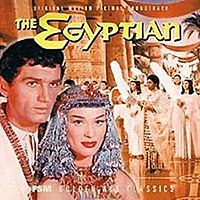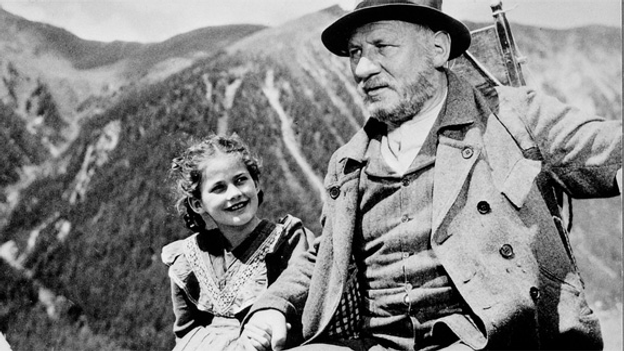Sinuhe, a poor orphan in Egypt during the eighteenth-dynasty, rises to fame as a great physician and, along with his friend Horemheb (Victor Mature) is appointed to the service of the new Pharaoh (Michael Wilding). During the span of ten years, he learns dangerous secrets in the royal court, discovers enemies plotting against the pharaoh, learns who his true friends are, and has a life-changing encounter with the temptress, Nefer (Bella Darvi). Along the journey, Sinuhe seeks to find the answer to a question that has aroused his curiosity since his youth - Who Am I? and Who is My God?
The Egyptian, a 20th Century Fox release, was beautifully filmed in Cinemascope and featured a magnificent score by Alfred Newman and Bernard Herrmann. It should rank among the top epics of the 1950s but unfortunately, it has not yet shaken its reputation of being the first box-office flop shot in Cinemascope.
Why did it fail at the box-office? That's difficult to fathom because the film really is entertaining and the production quality is top-notch. Additionally, it was helmed by an old pro, director Michael Curtiz (Casablanca, Mildred Pierce) and based on a best-selling novel.
Mika Waltari's "The Egyptian" was first published in 1945 in Finnish and is still considered one of the greatest books in Finnish literary history.
The unchanging nature of mankind is essentially the theme to the novel and this provides the basis of the film, too, but, it being a Hollywood production, Nefer's seduction of Sinuhe and how this leads to his downfall gets the spotlight attention. Bella Darvi entraps her man so cunningly that he is bewitched and does not know that he is sacrificing everything he worked so hard to earn. Or rather, he does know but is addicted to her love by that point.
It is only Kaptah (Peter Ustinov) and Merit (Jean Simmons), his two dear friends from his days in poverty, that stay near him in his hour of peril. Merit has loved him since he was a boy but he is blind to it and instead, searches for a greater meaning to his life outside of his medical work.
It is only Kaptah (Peter Ustinov) and Merit (Jean Simmons), his two dear friends from his days in poverty, that stay near him in his hour of peril. Merit has loved him since he was a boy but he is blind to it and instead, searches for a greater meaning to his life outside of his medical work.
On the opposite scale is another romance, a much more animal relationship, between the Pharoah's sister (Gene Tierney) and Horemheb, who is seeking to use her to climb his way up to becoming the commander of the Egyptian army.
The Egyptian has as much intrigue in its production history as it does in its plot. The film was originally planned as an epic vehicle for Marlon Brando. Kirk Douglas and Jean Peters were to be his co-stars but, just a week before filming was to begin, Brando backed out.The role was then given to MGM-star Edmund Purdum (after Cameron Mitchell, Farley Granger, and Dirk Bogarde were all first considered).
 Peters was later replaced by Simmons, and Kirk Douglas went on to make 20,000 Leagues Under the Sea for Walt Disney instead. Bella Darvi was a protege of producer Darryl Zanuck and his wife Virginia ("Darvi" is a combination of their first names) and, at the time of filming, Darryl was besotted with Bella, so the film really became a way for him to promote her career as well.
Peters was later replaced by Simmons, and Kirk Douglas went on to make 20,000 Leagues Under the Sea for Walt Disney instead. Bella Darvi was a protege of producer Darryl Zanuck and his wife Virginia ("Darvi" is a combination of their first names) and, at the time of filming, Darryl was besotted with Bella, so the film really became a way for him to promote her career as well. The picture had an enormous budget of $3.5 million dollars. Many of the sets, costumes, and props were later loaned to Paramount for Cecil B. DeMille's The Ten Commandments, which was released the same year. Peter Ustinov, when asked what it was like being involved in such an enormous production, said, "It was like being on a monstrously huge set of Aida and not being able to find the way out."
"I have spent my life in seeking knowledge. This is what I know. I have written this for you my son, wherever you are and for your children and your children's children. It is a poor legacy. But it is all I have."
 The Egyptian has always been a personal favorite of mine because it mixes action and adventure with romance and the drama of Sinuhe's life, from his quick rise to becoming the Pharaoh's physician, to being a condemned criminal and an outcast in his homeland. The entire cast is excellent, especially Peter Ustinov, who provides some comic relief. Also in the cast is Henry Daniell, John Carradine, Judith Evelyn, Tommy Rettig, and Michael Ansara.
The Egyptian has always been a personal favorite of mine because it mixes action and adventure with romance and the drama of Sinuhe's life, from his quick rise to becoming the Pharaoh's physician, to being a condemned criminal and an outcast in his homeland. The entire cast is excellent, especially Peter Ustinov, who provides some comic relief. Also in the cast is Henry Daniell, John Carradine, Judith Evelyn, Tommy Rettig, and Michael Ansara. This review is my contribution to the 90 Years of Jean Simmons Blogathon running today through January 31st. It is being hosted by The Wonderful World of Cinema and Phyllis Loves Classic Movies, so be sure to head over to either of these sites to read more Jean Simmons film reviews!





















